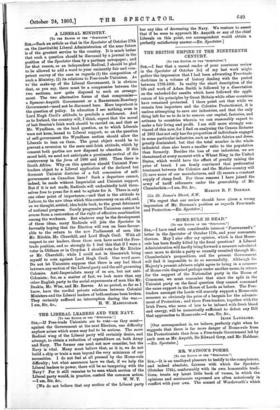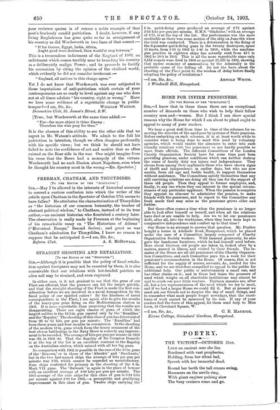MR. WATSON'S POEMS.
[To THE EDITOR OF THE " SPECTATOE:g SIR,—It is an unalloyed pleasure to testify to the conspicuous, and indeed absolute, fairness with which the Spectator (October 17th), conformably with its own honourable tradi- tions, treats my latest little book of verses, in which the opinions and sentiments expressed are often notoriously in conflict with your own. The sonnet of Wordsworth's which
your reviewer quotes is of course a noble example of that poet's fearlessly candid patriotism. I doubt, however, if any living Englishman has gone quite so far in arraignment of his country as did Wordsworth in two lines of that sonnet
" If for Greece, Egypt, India, Africa,
Aught good were destined, thou would'st step between." This is a tremendous indictment of the England of 1803, an indictment which comes terribly near to branding his country as a deliberately malign Power ; and he proceeds to fortify his accusation by citing the opinion of the civilised world, which evidently he did not consider irrelevant :— " England, all nations in this charge agree."
Yet I do not know that Wordsworth was ever subjected to those imputations of anti-patriotism which certain of your contemporaries are so ready to level against any one who does not at all times adulate "his country, right or wrong." Have we here some evidence of a regrettable change in publics [True ; but Wordsworth at the same time added. :— " Far—far more abject is thine Enemy : Therefore the wise pray for thee."
It is the absence of this ability to see the other side that we regret in Mr. Watson's attitude. We admit to the full his patriotism in intention, though we often disagree profoundly with his specific views ; but we think he should not have failed to note the sordidness of act and motive that so often existed on the Boer side in the war. One might imagine from his verse that the Boers had a monopoly of the virtues. Wordsworth had no such illusion about Napoleon, even when he thought his country most in the wrong.—En. Spectator.]























































 Previous page
Previous page